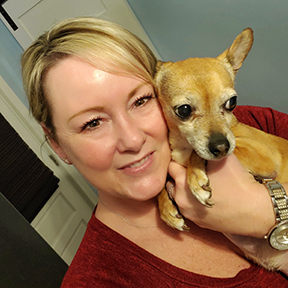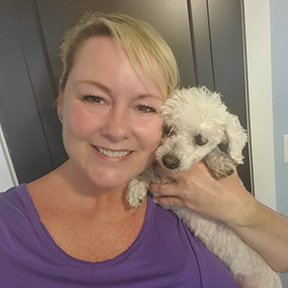
In the United States, the American Pet Products Association estimates people own 78 million dogs and 86 million cats. Unfortunately, as these animals age, sometimes their owners no longer want them or cannot provide proper care. Fortunately, there’s Jennifer Schnitz, who fosters senior dogs until they find their forever homes. She also works as a senior talent acquisition partner for Meritas Health, a subsidiary of North Kansas City Hospital.
Jennifer has a soft spot for dogs ages 8 years and older. “Many senior dogs end up in shelters and are euthanized because of health issues,” Jennifer explained.
Life of Helping

Mealtime at Jennifer’s house comes with special food, medications and several dishes for her fosters and adopted canines.
Helping animals isn’t new for Jennifer. In a previous job, she organized a volunteer day at a local shelter. Instead of birthday gifts she requests donations for animal shelters, and she helps stray animals she finds on the roads.
Jennifer currently volunteers and fosters for Always & Furever Midwest Animal Sanctuary in Springhill, KS. Over the last three years, the organization has saved more than 2,000 dogs. They rescue dogs throughout the Midwest who are harder to place, most due to age and health issues. They recently expanded to include cat rescue. “When you foster an animal, it allows the shelter to intake another animal so in essence you are saving two lives,” Jennifer explained.
Canine Companions
Since Jennifer started fostering in September 2020, she has fostered eight dogs. She successfully found a home for a bonded pair, Billy, age 8, and Rudy, age 12, whose owner passed away (pictured above). Another bonded pair, Doc and Wyatt, found their way to Jennifer. Doc was adopted, but Wyatt, who was blind, passed away.
While the dogs are in Jennifer’s care, Always & Furever provides food, medications and supplies and pays medical expenses. Jennifer provides the TLC, transports animals to vet appointments, promotes the dogs on social media and makes sure the dogs are available to meet potential adopters.
Foster Failure Success

Jennifer fostered and then adopted Bambi Kay, now 12 years old.
It is not uncommon for fosters to experience the phenomena of “foster failure” or adopting dogs they fostered. For example, while Jennifer was fostering Bambi Kay, 12, Ryder, 8, and Izzy Doodle, 13, they tugged at her heart and she adopted them. They joined Riley and Bella, who Jennifer has had since they were puppies, and are now age 12.
Special Accommodations
Sometimes senior dogs need extra help getting around, so Jennifer added a ramp to her deck and stairs to her couch and bed. She also strategically places heating pads around the house to soothe aching canine joints. “My bed seems to be getter smaller and smaller,” said Jennifer, who typically has seven furry friends sleeping with her.
Bedtime isn’t the only time Jennifer spoils her dogs. They get their share of treats, especially when it’s time for their medications. “When I am really old, I hope someone feeds me cheeseburgers,” Jennifer laughed.
Always Helping
Besides fostering, Jennifer also helps the shelter in other ways by volunteering, donating, sharing supplies and promoting senior dog adoptions on social media. “If we can save even one animal, it’s worth it,” Jennifer smiled.
“When you foster an animal, it allows the shelter to intake another animal so in essence you are saving two lives,” Jennifer explained.
Health Benefits
There are many health benefits for pet fosters and owners. Studies have shown that the bond between people and animals can increase fitness levels, lower stress and bring happiness. Animals increase opportunities for exercising, spending time outdoors and socializing. Regular walks and pet playtime can decrease blood pressure and lower cholesterol and triglyceride levels. Animals can help manage loneliness and depression through their companionship.

Jennifer recently picked up her newest foster, Gwinnie, a poodle.
10 Reasons to Adopt a Senior Dog
- Come already housetrained
- Grown out of the puppy stage (no teething)
- Learn more quickly because they are more focused
- Understand what “no” means
- Settle in more easily because they know how to be part of a pack
- Give love because they are grateful for a second chance
- Show more of their true personality, unlike puppies who can grow up to be different than expected
- Eager to hike, take car trips and enjoy other activities
- Require less energetic play than younger dogs
- Adapt more easily with less need for comforting and bathroom breaks
Copyright ©1997 – 2021. The Senior Dogs Project
Explore More
Smoking Dangers for Your Four-Legged Friends



